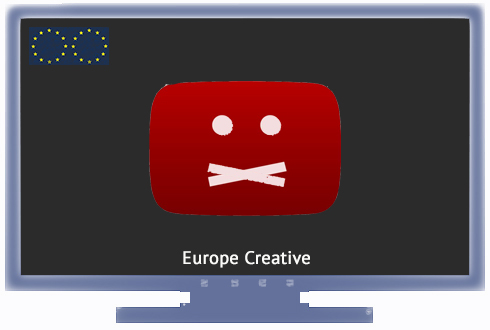
Meme: EU draft directive makes provisions for copyright filters @ rww CC-BY 2.0
EU copyright laws have long been lagging behind the digital reality. So the new ‘Directive on Copyright in the Digital Single Market’ is designed to remedy this situation. While the EU bodies and representatives of the member states have reached agreement on extensive areas of the complex issue, a fierce controversy has erupted over regulations on protecting digital press publications and on the resulting claims to fair compensation (Articles 11 and 12) as well as measures against online copyright infringements (Art. 13). The final vote on the copyright package, which had already been scheduled several times, was postponed again in December. This means there is still a chance to exert some influence over the legislation before the new date of 25 January 2018.
Article 13 is of particular importance for all those working with films and other audio-visual media. The proposal calls for obliging providers of online services to take measures to prevent the uploading of copyrighted material (sounds, images, graphics, etc.). This means that providers of services on YouTube, Facebook, Dropbox, Wikipedia and alternative platforms are required to check the rights in advance of publication and block user uploads containing unlicensed, protected material. How they are to do so is the providers’ problem. There is talk in the industry and the scene of automatic upload filters.
A number of associations, initiatives, academics and other groups have meanwhile spoken out against such ‘censorship filters’ (#censorshipmachine). The European Digital Rights association (EDRi), for example, together with 56 other European organisations, has called in an open letter addressed to EU decision-makers for the deletion of Article 13 from the draft directive. The requirement would namely violate the fundamental civil rights of internet users worldwide, including freedom of expression. Complaints have also been voiced that the regulation transfers the responsibility for legal decisions and the prosecution of infringements to commercial enterprises.
Such upload filters would affect not only creative works by individual users, such as memes, remixes or mashups, but also non-commercial use of content by educational institutions and archives. In addition, start-ups and smaller European companies that cannot afford the expensive technology for content recognition with determination of license rights would be put at a disadvantage (Google is said to have invested $60 million in its ‘Content ID’ system). It is likewise doubtful whether algorithms can reliably distinguish at all between copyright infringement and permitted use (quotation, parody, art, etc.).
The automatic monitoring techniques required are still in their infancy, and there are certainly no comprehensive rights databases available at this time. The most technically advanced system to date is the ‘Content ID’ system launched in 2013 by Google (now Alphabet Inc.), which at least at the start led to a dramatic number of false positives (see Forbes report).
‘Content ID’ automatically scans uploaded material and compares the result with entries in its own database. This database however only lists rights that have been entered in Google/YouTube by the copyright holders themselves. If an infringement is noted, the rights holder decides how to proceed. Since there is no other system available, this leads, among other things, to many rights holders making their content available only on YouTube. And users who don’t want to risk warnings and possible litigation are also ‘better off’ after a successful upload on YouTube than anywhere else, even better off than on their own website, where they are subject to the general copyright law. But this ‘Google law’ (see article by netzpolitik.org) is not a solution, because its application can be revoked and it only applies within the Google ecosystem.
Currently, big global corporations are at work devising an alternative strategy for ‘proactively’ resolving the copyright problem. Shortly before Christmas 2017, the press reported that Facebook had signed a license agreement with Universal Music Group that allows users of Facebook (also including Instagram and Oculus) to make use of UMG music under certain circumstances. In this context, it was discovered that Facebook is developing its own software, comparable to Google’s ‘Content ID’. Facebook is also in discussion with the other major players in the music business, Warner Music Group and Sony Music Group, with the aim of reaching similar agreements.
YouTube/Alphabet is once again a step ahead here and already concluded deals with Universal Music and Sony Music in December 2017 after reaching an initial agreement with Warner Music. The package includes a new music platform on subscription basis for the direct marketing of music titles. It is scheduled to go online in 2018 under the paradoxical name ‘Remix’ (effectively putting an end to genuine remixes ;-).
Just how powerful large private enterprises have become and what sovereign tasks are now being entrusted to them through measures such as the EU directive is demonstrated by an example from France (which together with Spain and Portugal is one of the supporters of the upload filter). Under the auspices of the Centre National du Cinéma (CNC), the French anti-piracy authority ALPA recently signed an agreement with Google under which YouTube will allow ALPA to use the Content ID recognition tool to centralise and block content requests (see article in LesEchos magazine).
Further information and petition platforms:
‘Directive on Copyright in the Digital Single Market’: all language versions
Info in animated film form: #FixCopyright by Copyright4Creativity
Explanation of the ‘censorship machine’: Busting the myths
The latest news and info from the ‘initiative urheberrecht – Kreativität ist was wert’
Leaked documents on the new copyright directive on Statewatch (with critical questions from six member states, including Germany)
Open letter to the EU from 80 organisations and institutions (pdf)
EDRi campaign with EU contact addresses: Time to stop the #CensorshipMachine: Now!”
Multilanguage campaign launched by Mozilla: German, English
Multilanguage campaign ‘Save the Meme’
see also Part 1 (on browser copy protection)
1 Trackback